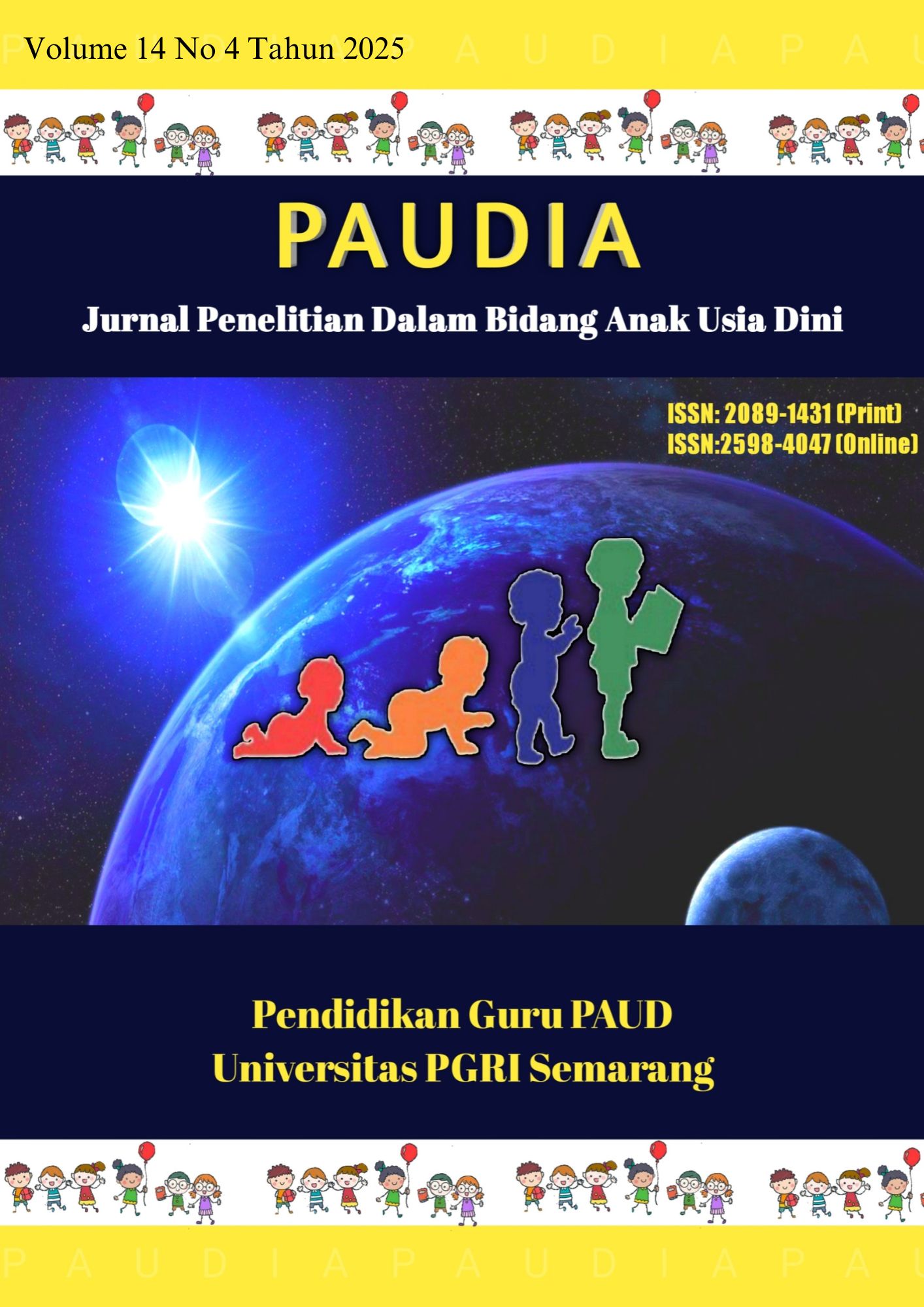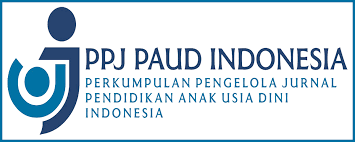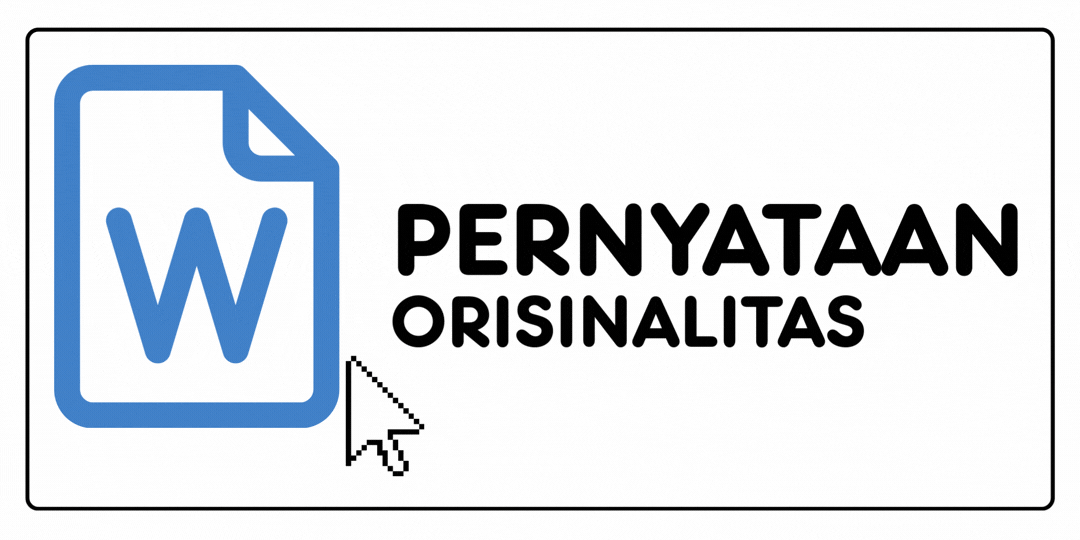Mendorong Perkembangan Sosial Emosional Melalui Proyek Pembelajaran Berbasis Layanan Inklusif untuk Siswa IECE
DOI:
https://doi.org/10.26877/paudia.v14i4.2389Kata Kunci:
Siswa PAUD, Inklusif, Pembelajaran Berbasis Layanan, Sosial EmosionalAbstrak
Aspek perkembangan sosial-emosional sangat penting bagi perkembangan keseluruhan anak-anak usia dini, terutama di kelas inklusif awal masa kanak-kanak di mana anak-anak memiliki berbagai kebutuhan yang beragam. Di Indonesia, sejumlah program pendidikan inklusif masih menghadapi tantangan dalam mengembangkan empati, kerja sama, dan regulasi emosi, menunjukkan bahwa strategi berbasis bukti untuk membantu anak-anak usia dini mengembangkan kemampuan ini merupakan prioritas mendesak. Penyelidikan ini berfokus pada dampak pengalaman belajar melalui pelayanan (service-learning) bagi anak-anak dalam program pendidikan inklusif awal masa kanak-kanak. Dua belas siswa berusia 5 hingga 6 tahun berpartisipasi dari kelas inklusif, menggunakan desain campuran. Pengumpulan data kuantitatif diperoleh dari tes PAPI, sementara bagian kualitatif terdiri dari pengamatan kelas seputar interaksi teman sebaya dan regulasi emosi, serta wawancara semi-terstruktur dengan guru tentang keterlibatan dan kelayakan. Secara keseluruhan, siswa menunjukkan peningkatan rata-rata 32% dalam kompetensi sosial-emosional, dengan peningkatan terbesar pada empati (35%), kerja sama (30%), dan regulasi emosi (28%). Guru juga mencatat peningkatan partisipasi dan kerja sama antar siswa. Hasil ini menunjukkan bahwa pembelajaran berbasis layanan merupakan intervensi efektif untuk meningkatkan kompetensi sosial-emosional di kelas prasekolah inklusif. Penelitian ini memberikan kontribusi praktis bagi pendidik dan pembuat kebijakan di Indonesia untuk menerapkan pembelajaran berbasis layanan dalam pendidikan inklusif yang mendukung perkembangan sosial-emosional serta pembelajaran yang adil sejak awal masa pendidikan.
Referensi
Ainsworth. (1978). PATTERNS OF ATTACHMENT.
Ahmed, I., Hamzah, A. B., & Abdullah, M. N. L. Y. B. (2020). Effect of social and emotional learning approach on students’ social- emotional competence. International Journal of Instruction, 13(4), 663–676. https://doi.org/10.29333/iji.2020.13441a
Bandura. (1977). Bandura_SocialLearningTheory.
Bennett, J., Parsons, S., & Kovshoff, H. (2024). Developing the emotion regulation skills of autistic pupils in educational settings: A systematic literature review. Journal of Research in Special Educational Needs , 24(3), 475–491. https://doi.org/10.1111/1471-3802.12646
Blewitt, C., O’Connor, A., May, T., Morris, H., Mousa, A., Bergmeier, H., Jackson, K., Barrett, H., & Skouteris, H. (2021). Strengthening the social and emotional skills of pre-schoolers with mental health and developmental challenges in inclusive early childhood education and care settings: a narrative review of educator-led interventions. In Early Child Development and Care (Vol. 191, Issue 15, pp. 2311–2332). Routledge. https://doi.org/10.1080/03004430.2019.1704283
Deci, E. L., & Ryan, R. M. (2000). The “What” and “Why” of Goal Pursuits: Human Needs and the Self-Determination of Behavior.
Denham, S. A., Bassett, H. H., & Zinsser, K. (2012). Early childhood teachers as socializers of young children’s emotional competence. In Early Childhood Education Journal (Vol. 40, Issue 3, pp. 137–143). https://doi.org/10.1007/s10643-012-0504-2
Eisenberg, N., Spinrad, T. L., & Knafo-Noam, A. (2015). Prosocial Development.
Elias, M. J. (2004). The connection between social-emotional learning and learning disabilities: Implications for intervention. Learning Disability Quarterly, 27(1), 53–63. https://doi.org/10.2307/1593632
Eyler, J. (2002). Reflection: Linking Service and Learning-Linking Students and Communities. In Journal of Social Issues (Vol. 58, Issue 3).
Filges, T., Dietrichson, J., Viinholt, B. C. A., & Dalgaard, N. T. (2022). Service learning for improving academic success in students in grade K to 12: A systematic review. In Campbell Systematic Reviews (Vol. 18, Issue 1). John Wiley and Sons Inc. https://doi.org/10.1002/cl2.1210
Gross, J. J., Feldman Barrett, L., John, O., Lane, R., Larsen, R., & Pennebaker, J. (1998). The Emerging Field of Emotion Regulation: An Integrative Review. In Review of General Psychology (Vol. 2, Issue 5).
Hassani, S., & Schwab, S. (2021). Social-Emotional Learning Interventions for Students With Special Educational Needs: A Systematic Literature Review. In Frontiers in Education (Vol. 6). Frontiers Media S.A. https://doi.org/10.3389/feduc.2021.808566
Hollingsworth, H. L., & Winter, M. K. (2013). Teacher beliefs and practices relating to development in preschool: importance placed on social-emotional behaviours and skills. Early Child Development and https://doi.org/10.1080/03004430.2012.759567
Isabella, W., Saggers, B., & Research Online, G. (2014). Strengthening social and emotional learning in children with special needs Book Title Health and Wellbeing in Childhood Rights statement Link to published version. http://hdl.handle.net/10072/66523http://www.cambridge.org/gb/academic/subjects/education/education-history-theory/health-and-wellbeing-childhood
Khoiriyah, U., Setyowati, S., Nursalim, M., & Khamidi, A. (2024). Analysis of Inclusive Education Policy Implementation in Developing Countries. EDUKASIA: Jurnal Pendidikan Dan Pembelajaran, 5, 851–858. https://jurnaledukasia.org
Knezović, N. (2020). All Learning is Social and Emotional : Helping Students Develop Essential Skills for the Classroom and Beyond. Acta Iadertina, 16(2). https://doi.org/10.15291/ai.2953
Mamuaya, C. L. (2025). Building Better Behavior: How School Environments Shape Student Character. International Journal of Scientific Research and Management (IJSRM), 13(05), 4105–4112. https://doi.org/10.18535/ijsrm/v13i05.el05
Marliana, L., Dewi, N. F. K., & Jaya, D. E. (2025). Implementation of Inclusive Education in Playgroups. PAUDIA : Jurnal Penelitian Dalam Bidang Pendidikan Anak Usia Dini, 393–406. https://doi.org/10.26877/paudia.v14i2.1614
McMillan, D. W., & Chavis, D. M. (1986). Sense of community: A definition and theory. Journal of Community Psychology, 14(1), 6–23. https://doi.org/10.1002/1520-6629(198601)14:1<6::AID-JCOP2290140103>3.0.CO;2-I
Morch, A. I., Hartley, M. D., & Caruso, V. (2015). Teaching interpersonal problem solving skills using roleplay in a 3D virtual world for special education: A case study in second life. Proceedings - IEEE 15th International Conference on Advanced Learning Technologies: Advanced Technologies for Supporting Open Access to Formal and Informal Learning, ICALT 2015, 464–468. https://doi.org/10.1109/ICALT.2015.139
Morton, B., & Pilgrim, J. (2023). Promoting inclusive education: social and emotional learning through the Lens of Universal Design for Learning. Eesti Haridusteaduste Ajakiri. Estonian Journal of Education, 11(1), 28–47. https://doi.org/10.12697/eha.2023.11.1.02b
Okongo, R. B., Ngao, G., Rop, N. K., & Nyongesa, W. J. (2015). Journal of Education and Practice www.iiste.org ISSN (Vol. 6, Issue 35). Online. www.iiste.org
Rahmawati, I., Filasofa, L. M. K., & Mursid. (2025). Achieving Inclusivity: Uncovering Constraints and Challenges in Accepting Children with Special Needs in Non-Inclusive Schools. PAUDIA: Jurnal Penelitian Dalam Bidang Pendidikan Anak Usia Dini, 525–543. https://doi.org/10.26877/paudia.v14i3.1764
Rafiyya, A., Kraiwanit, T., Limna, P., Sonsuphap, R., Kasrisom, A., & Snongtaweeporn, T. (2024). Early childhood social-emotional development: an impact on a developing country. International Journal of Evaluation and Research in Education, 13(5), 3081–3089. https://doi.org/10.11591/ijere.v13i5.29462
Raver, C. C. (2002). Emotions Matter: Making the Case for the Role of Young Children’s Emotional Development for Early School Readiness. Social Policy Report, 16(3), 1–20. https://doi.org/10.1002/j.2379-3988.2002.tb00041.x
Sciacca, J. L. (2025). TEACHER EXPERIENCES WITH PJBL AND EBD 1 Experiences of Teachers Using Project-Based Learning with Students with Emotional and Behavioral Disorders.
Sin, D. Y. E., Chew, T. C. T., Chia, T. K., Ser, J. S., Sayampanathan, A., & Koh, G. C. H. (2019). Evaluation of Constructing Care Collaboration - Nurturing empathy and peer-to-peer learning in medical students who participate in voluntary structured service learning programmes for migrant workers. BMC Medical Education, 19(1). https://doi.org/10.1186/s12909-019-1740-6
Stalmach, A., Reinck, C., D’Elia, P., Di Sano, S., & Casale, G. (2025). A conceptual impact model of digital support for student self-regulation and emotion regulation grounded in self-determination theory. Discover Education, 4(1). https://doi.org/10.1007/s44217-025-00825-8
Stavroula, V. A., & Mary, K. (n.d.). Investigating the Impact of Differentiated Instruction in Mixed Ability Classrooms: It’s impact on the Quality and Equity Dimensions of Education Effectiveness.
Sudimantara, L. B., Baehaqi, L., Lian, A., & Lian, A.-P. (2025). Multisensory CALL for Under-Resourced Universities and Schools in Indonesia. In Multisensory CALL for Under-Resourced Universities and Schools in Indonesia. https://doi.org/10.1007/978-3-031-91387-7
Vitriana, B., Purwanti, S., Honest, B., Ramadhani, D., Mulia Balikpapan, U., & Timur, K. (2024). Kesiapan Sekolah dalam Melaksanakan Pendidikan Inklusi di PAUD. 13(2), 303–314. https://doi.org/10.26877/paudia
Walog, R., Revalde, H., Duites, A., Opingo, K. M., Mangubat, R., & Espina, R. (2024). Journal of Humanities and Social Sciences Studies Building Social-Emotional Foundations in Early Childhood Education: Approaches and Outcomes. https://doi.org/10.32996/jhsss
Unduhan
Diterbitkan
Terbitan
Bagian
Lisensi
Hak Cipta (c) 2025 Bimbi Lastri Prima Asih, Ernawulan Syaodih, Asep Deni Gustiana, Nordiana Zakir

Artikel ini berlisensiCreative Commons Attribution-NonCommercial-ShareAlike 4.0 International License.







